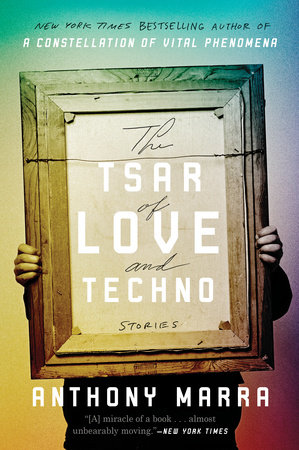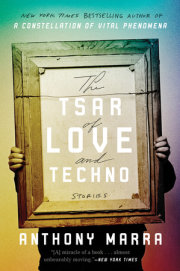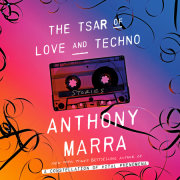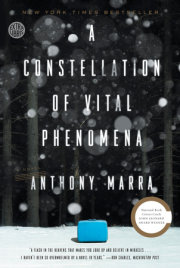The Leopard
Leningrad, 1937
I am an artist first, a censor second.
I had to remind myself of this two years ago, when I trudged to the third-floor flat of a communal apartment block, where my widowed sister-in-law and her four-year-old son lived. She answered the door with a thin frown of surprise. She wasn't expecting me. We had never met.
"My name is Roman Osipovich Markin," I said. "The brother of your husband."
She nodded and ran her hand along the worn pleat of a gray skirt as she stood aside to allow me in. If the mention of Vaska startled her, she hid it well. She wore a blond blouse with auburn buttons. The comb lines grooving her damp dark hair looked drawn on by charcoal pencil.
A boy was slumped into the divan's mid-cushion sag. My nephew, I supposed. For his sake, I hoped he took after his mother.
"I don't know what my brother has told you," I began, "but I work in the Department of Party Propaganda and Agitation. Are you familiar with the job?"
"No," the boy said. The poor child had inherited his father's forehead. His future lay under a hat.
To his mother: "Your husband really didn't talk about me?"
"He did mention a brother who was something of the village idiot in Pavlovsk," she said, a bit more cheer to her tone. "He didn't mention you were balding."
"It's not as bad as it looks," I said.
"Perhaps you could get to the purpose of your visit?"
"Every day I see photographs of traitors, wreckers, saboteurs, counterrevolutionaries, enemies of the people. Over the last ten years, only so many per day. Over the last few months, the usual numbers have grown. I used to receive a slim file each month. Now I receive one every morning. Soon it will be a box. Then boxes."
"Surely you haven't come only to describe the state of your office?"
"I am here to do my brother a final service," I said.
"And that is?" she asked.
My vertebrae cinched together. My hands felt much too large for my pockets. It's a terrible thing, really, when said aloud. "To ensure that his misfortune doesn't become a family trait."
She gathered every photograph she had of Vaska, as I asked. Nine in total. A marriage portrait. A day in the country. One taken the day they moved to the city, their first act as Leningraders. One of Vaska as a boy. She sat down on the divan and showed each to her boy for a final time before bringing them to the bedroom.
She arrayed them on the desk. Her bedroom was mainly bare floor. The bed still wide enough for three, the blanket neatly pulled over a flabby mass of pillows. She must have only shared it with her son now.
I slid a one-ruble coin across the desk, hammer-and-sickle side up.
"What am I to do with this?"
I nodded at the photos. "You know what to do."
She shook her head, and with a sweep of her forearm that sent a small galaxy of dust motes into orbit, she winged the coin to the floor.
Could she have still loved my brother? Hard to believe. He'd been proven guilty of religious radicalism by an impartial and just tribunal. He'd received the only sentence suitable for a madman who poisoned others with the delusion that heaven awaits us. Paradise is possible only here on earth, possible only if we engineer it. One shouldn't envy this woman's blind devotion to a man who has proven himself unworthy of love. One mustn't.
She pressed her palms over the photographs, threw her elbows out to shield the images with her broad back, an instinct that suggested a starving creature protecting her last morsels, and this may be true: The stomach is not the only vital organ that hungers.
"Leave," she said, a ragged edge to her voice. She stared at the back of her hands. "Leave us be."
I could have turned, walked out of the room, closed the door on the whole affair. I'd done more than was required already. But something kept my heels pinned to the floorboards. Even though the concept of family was slipping into history as swiftly as the horse and carriage, I didn't have a wife or child of my own, and I wanted someone who shared my blood to live to see that paradise we've given ourselves to achieve. I wanted that little fellow out there on the divan to grow up, to become an active builder of communism, to look back on his life when he is a fat and happy old man, to know that the faultless society surrounding him justifies his father's death, and then, to be grateful for the lesson taught by the uncle he briefly met on a cold winter morning a lifetime ago.
It's silly. I know.
I grabbed her wrist and pinched the coin between her fingers.
"I'm not here to hurt you," I told her. "I'm here to make sure you don't get hurt. Your husband was an enemy of the people. What do you think will happen if NKVD men search the flat and find all these photographs? Must I go into greater detail?"
Whatever naked sentiment splayed itself across the table recoiled within her. She kept hold of the coin when I let go. That coin could have bought a meat pie, a sketch pad, a confectionary, a bar of soap; pressed into someone else's palm it could have become the bright spot in a dull day, but coins cannot choose their fate.
"Why can't you do it? You're the artist. This is your job."
I checked my watch. "I don't begin work for another hour."
When I heard the slow scratch of the coin on photo paper, I turned away. In the living room, the boy sat quietly peering at the thin lines etched upon his palms.
It was uncanny how much he resembled his father. A nose he hadn't yet grown into; a messy thatch of black hair, each follicle aimed in a different direction; lips pursed as small as a button. I would have been eight when Vaska was his age. Summer days we roamed the forests and fields, and at night we tapped coded messages to each other through the wall between our rooms; we each had our own. I made him sit for me in every shade and season of light so that I could sketch his likeness, could preserve his expression in charcoal on the page. If not for Vaska, I would have never become an artist. His face was my apprenticeship.
"Do you speak?" I asked.
He nodded.
"With understatement, I see. Tell me your name."
"Vladimir."
I clasped his shoulder and he flinched, surprised by the sudden gesture of affection. He shared his first name with Lenin--an auspicious sign.
"I want to see if you can do something for me," I asked. "Are you willing to try?"
He nodded.
"Stare straight at me," I instructed, then I flashed my fingers by his ear. "How many am I holding up?"
He held up four fingers.
"Very good. You've got keen eyes. Someday you might be a sharpshooter or a watchman. I'm going to tell you the story of the tsar and the painting. Have you heard it?"
The coin scratching in the bedroom might have been wind rustling leaves; we might have been far from there, near a dacha, in a field, the sun burning just over our heads.
"No, I didn't think you would have," I said. "It begins with a young man who overthrows an evil tsar. The young man becomes the new tsar. He promises his subjects that their troubles will disappear if they obey him. 'What will this new kingdom look like?' his subjects ask. The tsar considers it and then commissions his court painters to paint a picture of what the new kingdom will look like.
"First the painting is only a few paces wide, then a few dozen paces, then hundreds of paces. Soon the painting is miles and miles wide. Now, this is a big painting, no? Raw materials are essential to its success. The flax that would have clothed the tsar's subjects is requisitioned for the canvas. The wood that would have built houses is requisitioned for the frame.
"When the subjects are cold, the tsar tells them to look at the painting and see the beautiful coats and furs they will soon wear. When they sleep outside, he tells them to look at the painting and see the beautiful homes they will soon live in.
"The subjects obey the tsar. They know that if they turn their eyes from the painting and see what is around them, if they see the world as it is, the tsar will make them disappear in a big poof of smoke. Soon, all his subjects are frozen in place, unable to move, just like their reflections in the painting."
The boy stared with a bored frown. He must have been accustomed to excellent storytelling. Literature for children receives less attention from the censors than literature for adults, so naturally our best writers flock to the genre.
"How many fingers am I holding up?" I asked.
He put up three.
I slid my hand farther into his periphery. "How many now?"
He put up one.
"And now?"
He began turning his head, but I snapped. "Eyes ahead. Just like people in a painting can't turn their heads to see who's behind them, neither can you."
"I can't see how many fingers," he said. "Your hand is too far back."
"That's right," I said. "That's where your father is. He's there, painted in the background, back behind your head, where you can't see. He's there, but you can never turn to look."
The coin scratching had silenced some time ago. When I looked up, the boy's mother was standing in the bedroom doorway. I followed her in. The photographs were lined neatly on the desk. In each one, a single face had been so violently scratched out that the desk's wood grain was visible through the hole. My eyes ached to see it. I closed them.
"Get photographs of your son every year," I advised. "If you're arrested, he'll be placed in a state orphanage who knows where. With a recent photograph, you'll have a better chance of finding him."
I was already at the door when she grabbed my wrist and turned me around.
"You're not finished," she said. "You owe my husband more."
"This is the best I can do."
Her hand was on my neck. The boy just sat there, across the room, watching with dark, dumb eyes. What did he see when he saw me? You remain the hero of your own story even when you become the villain of someone else's. His mother's chest indented on my forearm.
"You're in the party," she insisted. "Do something. Move us somewhere."
"I correct images. That's it."
"Then what more can we do? Tell me. When they go into an orphanage you never find them."
Her eyes were webbed with pink and her hands cupped my cheeks, her middle fingers tucked under my earlobes. There was something foreign in the hard, dense heat of her breath on my face. I couldn't recall the last time someone had breathed on me, nor the last time I had felt needed.
"You prove your loyalty," I said quietly. "That can work. In my own experience it has worked."
She looked to the boy, then took my hand. She led me past him, toward the bedroom, toward the bed still wide enough for two. All I wanted was to get out, to be rid of these people. Even so it was a relief to see that she would take her dead husband's brother to the bedroom, a relief to know that the boy might live to become that fat and happy old man because his mother understood, as his father never had, that it is not God or gravity but grace of the state that holds us upon the earth.
I shook my hand from her grip. She turned, uncertain. I leaned toward her, so the boy wouldn't overhear.
"You prove loyalty through betrayal." The words traveled no farther than the length of a little finger, from my lips to her ear. "You inform on someone close to you. This is what I know works."
Two years have passed since that morning. A month ago the department requisitioned my small office. A mean sense of humor, if little else, has filled the vacancy between my superior's ears: He has assigned me to continue our necessary work underground. Several hundred feet underground.
I bid the sky farewell and climb down. Amid dim electric bulbs, I imagine myself contracting within shadow, becoming Caravaggian. No matter how early I arrive, the workmen are already here: laying rail track, reinforcing tunnel cement, never raising their wary eyes to mine. I enter a sawdust swarm and on the other side emerge at the door of what will be the stationmaster's office.
Maxim, my assistant, has beaten me here. The worktable is already prepared with nozzles, cylinders of pressurized air, paint, sealed directives, and stacked files of uncorrected photographs.
Our Younger Stalins cabinet stands in the corner. It holds photographs of our vozhd taken ten to twenty years ago. When possible, we substitute a Younger Stalin for current ones. It's essential we convey to the people the youthful vigor of their elder statesman. The longer we do it, the further back in time we must go to find new material. Readers of certain periodicals may worry that he is growing younger with each passing year; by his seventieth birthday he will be a slender-faced adolescent.
"You're late, Comrade," Maxim says, speaking of slender-faced adolescents. The day we met, when the Department of Party Propaganda and Agitation first assigned him as my assistant, was the last day he saluted me. He sends letters praising the party leadership with the hope that the police will intercept, read, and record his expressions of loyalty. He makes no secret of wanting my post.
"I'm old, Comrade," I say.
Maxim, the little brute, nods in agreement.
By lunch we have corrected by airbrush three faces from a 1930 Foreign Trade Committee portrait that has been retouched so many times it's more painting than photograph. Or I should say, I have; Maxim contributes only cigarette smoke and a sour smirk. While concentrating on the face beneath my airbrush, I glance up to find Maxim concentrating on mine. The little brute couldn't erase pencil lead.
We lunch alone. Maxim stays in the mercury-vapor brightness of the office, while I wander through the tunnels. I have walked for hours through these tunnels and have found no end to them. Someday trains will carry the grateful citizens of a socialist paradise through this netherworld. All the work we have done here in their name will then be justified.
Copyright © 2016 by Anthony Marra. All rights reserved. No part of this excerpt may be reproduced or reprinted without permission in writing from the publisher.









